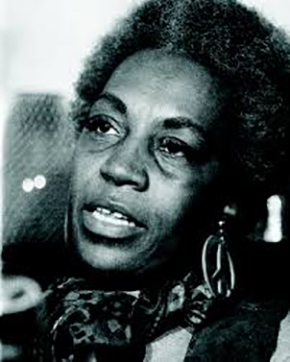Black History Month: Florynce Kennedy
 A cowboy hat, pink sunglasses and fake eyelashes…those were the trademark accessories for Florynce Kennedy, a woman who was recognized equally by her staple uniform as she was by her activism. Growing up in Missouri during a time when the Ku Klux Klan was locally operating, she was no stranger to local prejudice and her first form of activism came early against a local Coca-Cola bottling business who refused to hire black truck drivers. She also successfully sued Columbia University for denying her admission to their law school on the premise that she was a female, ending up graduating as the only black woman amongst the eight admitted. Convinced that rights of people of color as well as women’s rights could be changed positively if the two groups worked together, she served as an activist for both. She protested against the Miss America pageant in 1968, claiming the exploitation of women. She toured the lecture scene with Gloria Steinem. She also led boycotts of major advertisers if black people weren’t featured in their ads. Her later activism included founding the National Black Feminist Organization and protesting the lack of female bathrooms on Harvard University’s campus with a “pee-in.” With her seemingly unorthodox methods, Kennedy was often described in terms reserved for black women who disrupted the status quo. People magazine described her as, “the biggest, loudest and, indisputably, the rudest mouth on the battleground,” in 1974, a remark she wore as a badge of honor despite its negative connotation and association with the perception of an angry black woman. Forever a pusher of boundaries, she acted in a number of films in addition to her activism work. She passed away in 2000.
A cowboy hat, pink sunglasses and fake eyelashes…those were the trademark accessories for Florynce Kennedy, a woman who was recognized equally by her staple uniform as she was by her activism. Growing up in Missouri during a time when the Ku Klux Klan was locally operating, she was no stranger to local prejudice and her first form of activism came early against a local Coca-Cola bottling business who refused to hire black truck drivers. She also successfully sued Columbia University for denying her admission to their law school on the premise that she was a female, ending up graduating as the only black woman amongst the eight admitted. Convinced that rights of people of color as well as women’s rights could be changed positively if the two groups worked together, she served as an activist for both. She protested against the Miss America pageant in 1968, claiming the exploitation of women. She toured the lecture scene with Gloria Steinem. She also led boycotts of major advertisers if black people weren’t featured in their ads. Her later activism included founding the National Black Feminist Organization and protesting the lack of female bathrooms on Harvard University’s campus with a “pee-in.” With her seemingly unorthodox methods, Kennedy was often described in terms reserved for black women who disrupted the status quo. People magazine described her as, “the biggest, loudest and, indisputably, the rudest mouth on the battleground,” in 1974, a remark she wore as a badge of honor despite its negative connotation and association with the perception of an angry black woman. Forever a pusher of boundaries, she acted in a number of films in addition to her activism work. She passed away in 2000.
The liberalization of abortion in New York State can be attributed to Kennedy’s efforts. Along with a group of feminist lawyers, Florynce challenged the constitutionality of the state’s abortion law with the suit, Abramowicz v. Lefkowitz, that used the testimonies of women forced to get illegal abortions. The issues raised were related to the right of a woman to seek an abortion rather than the right of a doctor to practice medicine. (Source)
Between 1970, when New York repealed its abortion ban, and 1973 when Roe v. Wade was passed, 350,000 women came to New York for abortions. By the end of 1971, prior to Roe v. Wade, 61% of abortions were performed on non-New York state residents. (Source)
Today, NY is RHAP’s oldest cluster state, founded in 2009 and led by RHAP co-founder and medical director, Linda Prine. Our NY Cluster engages in several different forms of advocacy, from lobbying at the state capital for the Reproductive Health Act to hosting fundraising events for local Medical Students for Choice chapters.
